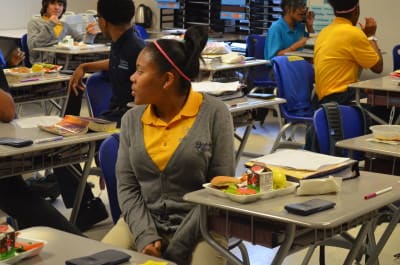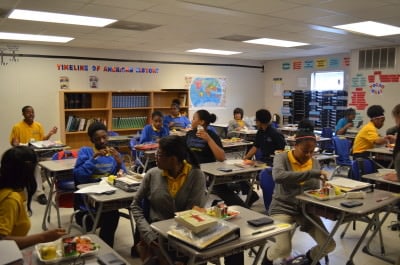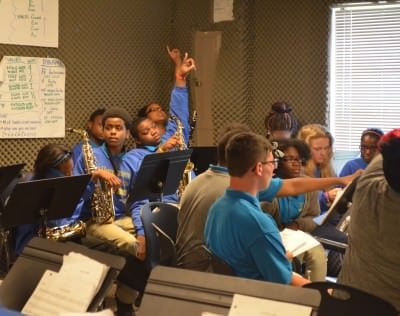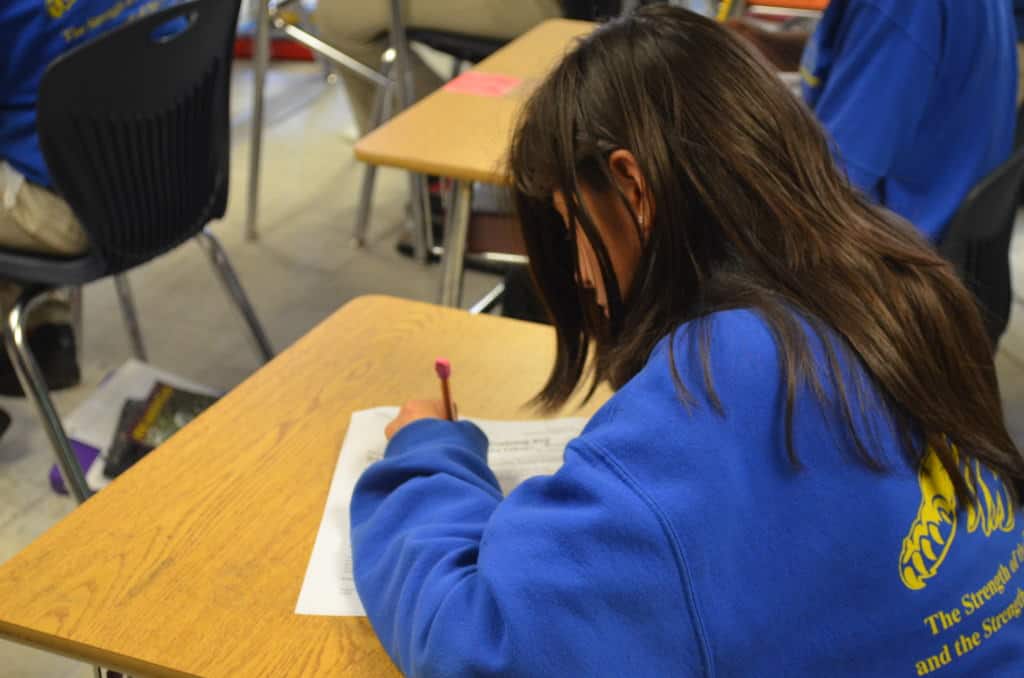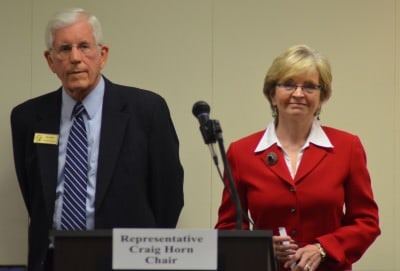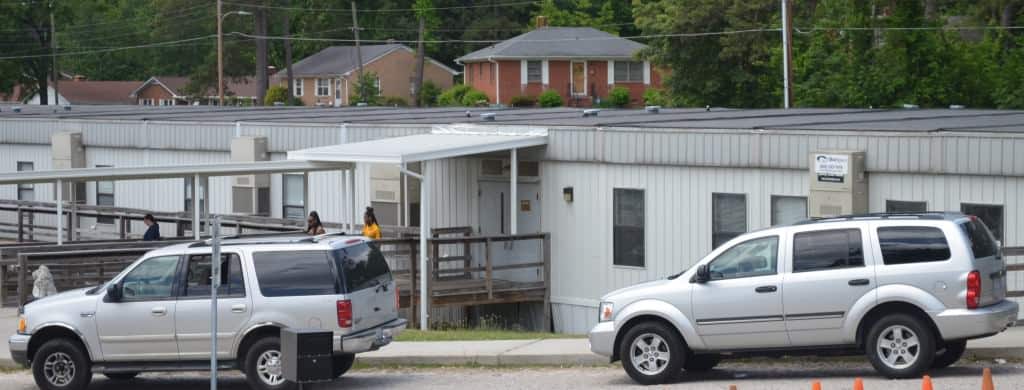

For our last school, we’re taking a departure from the formula we used for this investigation. Instead of visiting another traditional public school, I traveled to Henderson Collegiate, a charter school in Vance County, considered by some to be the best school in the state.
On the A-F grades, Henderson Collegiate received a B, but in contrast to the A schools I visited, its population of free-and-reduced-price lunch students is huge – 92 percent.
What caught our eye was the 100 percent score on growth for the school grade.
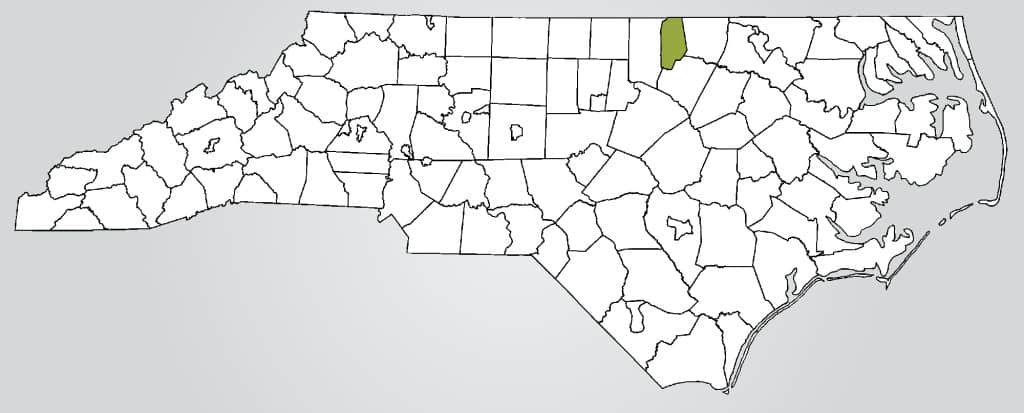

“The hope was to do something more. To do something more systematic. To be part of the solution,” said Eric Sanchez, co-founder and director of the school.
He and his wife moved to North Carolina in 2002 with Teach for America. They taught at a traditional school for a while before they started thinking that more was possible.
They went to another charter school, KIPP Gaston, to see a different model for learning. They liked it so much that they both taught there. But eventually, they decided to strike out on their own.
“We took a lot of the things we learned there when we started this school,” he said.
They opened Henderson Collegiate in 2010 with just a 4th grade class. They’ve grown quite a bit since.
Right now, Henderson Collegiate serves students in grades 4 through 8, but it’s adding 9th grade next year and plans to eventually be a K-12 school. With just grades 4-8, it’s already at 500 students and will reach 600 next year. It receives a little outside money, but Sanchez said it’s not a significant part of their budget. For the most part, it operates using the same funds traditional public schools receive from the state and the county, though it doesn’t receive funds from either for capital purchases.
Sanchez said that one of the things that distinguishes his school is the staff’s attitude towards the students.
One of the struggles North Carolina schools have is providing a first-rate education to low-income students. In the A-F school grades, many schools with a high percentage of free-and-reduced-price lunch students did poorly.
But Sanchez says socioeconomic background is no excuse.
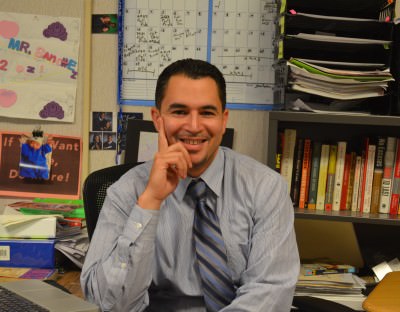

“A lot of times people are just blaming external forces. Saying things like we can’t overcome things that happen outside of our realm, outside of our school,” he said. “But we’re the authors of everything that happens in here.”
As you walk around the school, the walls are littered with posters. Some show the names of individual students and how well they’re doing in various subjects. Another shows the percentage of students who are proficient in a subject and how far they have to reach their goal: 100 percent. One poster has the school divided up into “countries.” This is part of Henderson Collegiate’s EOG training, which uses an Olympic theme and has students compete against each other for the highest scores. But you can win a medal for more than academics. Good work habits, for instance, can also help you garner a win.
Students always know how they’re doing, as do teachers.
“It creates this level of competition,” Sanchez said. “And I think it’s a level of, not necessarily me against you, but me against the field.”
If a student is falling behind, the school springs into action, scheduling meetings, extra work time, calls to parents… whatever it takes to bring the student up to where he or she should be performing.
Thirteen-year-old 7th grader Zanique Jones came to Henderson Collegiate in fourth grade. She attended a traditional school previously.
“It’s more structured and you get to do a lot more things,” she said of Henderson Collegiate.
Those “things” include end of year trips that can range from college visits to ice skating or even trips to Washington, D.C., or New York.
“All of these things build cultural capital and enable them to have those experiences and that capital,” Sanchez said.
And building cultural capital is an important part of the school. It even extends to food.
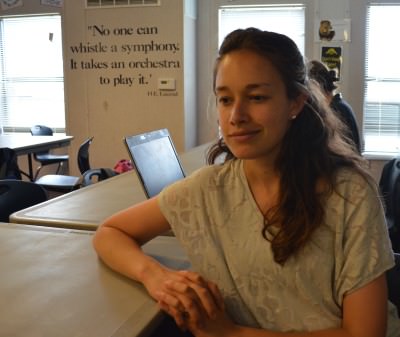

In September 2014, the school brought in Linden Thayer to be the school nutrition manager. She is a doctoral student in the Department of Nutrition at UNC, and she brought with her not just expertise, but a philosophy.
“For me food is a social justice issue,” she said. “I believe that good food is a human right.”
When she arrived, the school was serving typical school fare: chicken nuggets, corn dogs and that sort of thing.
She quickly put an end to that, and now the cafeteria makes everything from scratch. No more fried foods. Instead, the students have options like vegetarian chili, beef with broccoli, kiwi and even curry.
Thayer tries to buy the school’s food from local produce farmers, and next year plans to start bringing in local meat. Ultimately, she says it is cheaper to do this than stick with the traditional pre-packaged, easily served food normally found in school cafeterias.
“It’s been a great place to do what I think charters are meant to do: just really test the bonds and test the limits of what’s new and different and what could be possible,” she said.
Because of the high percentage of low-income students, the entire school receives free breakfast and lunch, which is not just a tool for healthy living, but also good academics. Children don’t think as well on an empty stomach, and to look at some of the numbers, Henderson Collegiate’s children are thinking just fine.
It’s one of only 12 charter schools to have exceeded expected academic growth for three consecutive years in North Carolina. It has done so for four years.
The 5th, 6th, and 7th grades outperformed the state average in the Reading EOG in 2014, and grades 4-7 outperformed the state in math, reaching nearly 80 percent for 6th and 7th graders. The state average for 6th and 7th grade was about 46 percent in math.
And in contrast to the A schools we’ve profiled this week, Henderson Collegiate is overwhelmingly minority – 84 percent black with 14 percent Hispanic students and only 2 percent white.
Henderson Collegiate is nimble and determined. It’s hard to pinpoint exactly why it is successful. High expectations and accountability, for sure – attributes we found at all the schools we wrote about this week. But in the end, it might all come down to attitude. Sanchez and his staff are determined that everybody succeed.
“The idea of one child falling through the cracks is not good,” he said. “It’s not what we’re about.”
The Map: School Report Cards
Monday: A-F Grades: Why early college high schools succeed
Tuesday: Ocracoke School: An education like no other
Wednesday: Rutherford College Elementary: Another community school
Wednesday: Riverbend Elementary School: Excellence and intimacy
Thursday: Henderson Collegiate: A school built on idealism
Friday: Why do some schools serving low-income populations get As?



